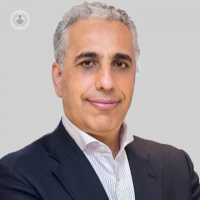The complex development of breast cancer, and how it is treated
Written by:In his latest online article, renowned consultant breast cancer surgeon and researcher Professor Kefah Mokbel gives a succinct explanation of what happens inside the body when cells become cancerous. He also delves into the various treatments for breast cancer, and whether or not a permanent cure is possible.

Why does cancer sometimes come back after initial treatment?
Although surgery and systemic drugs may eradicate visible tumours, dormant cells often survive, lying in wait for opportune moments to awaken and proliferate. The primary breast and regional lymph nodes serve as preferred sites for these reawakened cells to flourish, driven by familiarity and the availability of suitable infrastructure, known as the breast homing phenomenon. Consequently, patients who underwent lumpectomy and radiation therapy are more susceptible to local relapse. In the absence of the breast following mastectomy, dormant cells may seek refuge in distant organs, heightening the risk of distant metastasis and mortality.
Notably, treatments like immunotherapy and radiation therapy stimulate immune responses against breast cancer, potentially reducing the risk of distant metastasis. However, the dormancy characteristic of hormone-dependent cancers presents distinct challenges, as hormonal therapy induces dormancy rather than eradication. These dormant cells may attempt reawakening triggered by changes in their epigenome and the host's vulnerability. If they succeed, they re-enter the cell cycle and start proliferating, leading to cancer relapse. The reawakening of these cells serves as a warning sign of further reawakening in other dormant cancer cells, which could be resistant to the ongoing treatment the patient is receiving.
Conversely, cancers susceptible to the immune system, such as ER-negative and/or HER2-positive tumours, are more likely to achieve permanent cure with immunotherapy in responders.
In this complex ecosystem, less aggressive breast cancer cells compete with their fitter counterparts for resources, prompting a crucial question: Can systemic therapy be adjusted to spare some less aggressive cells? This delicate balance might be the key to restraining the growth of more aggressive cells by limiting their access to vital resources. Employing drugs in mixtures, sequences, and rotations akin to using insecticides could offer a more effective approach to prevent the proliferation of treatment-resistant cells.
Is a permanent cure possible?
To attain a permanent cure for breast cancer, the focus must shift towards eradicating dormant stem cells or preventing their reactivation through molecular targeting drugs that can be used in combination with existing therapies. Immunotherapy holds promise for cancers with clear molecular targets, offering hope for a future free from the shadow of breast cancer. It is worth highlighting that certain diet and lifestyle modifications are likely to play an important role in eradicating dormant cancer cells or preventing them from reawakening.
Professor Kefah Mokbel is a renowned consultant breast cancer surgeon and researcher based in London. If you would like to book a consultation with Professor Mokbel, you can do so today via his Top Doctors profile.


